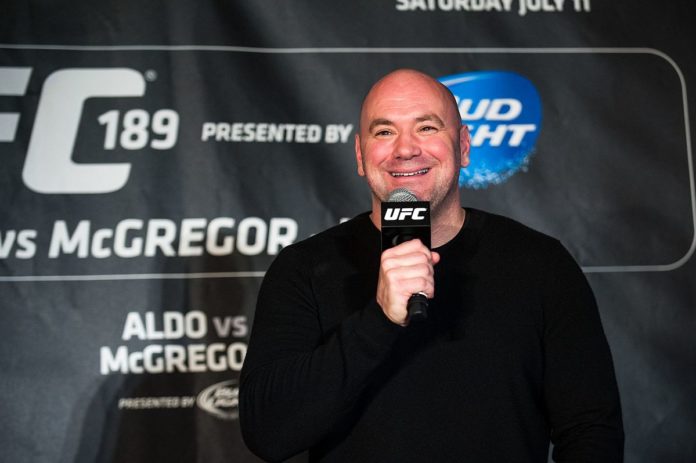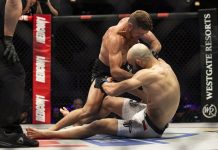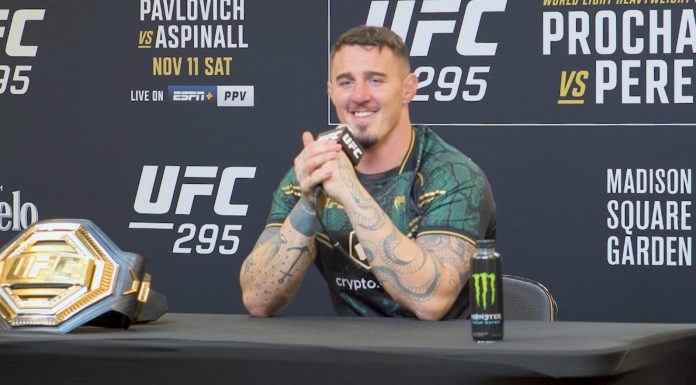
The UFC has been handing out “Performance of the Night” bonuses for years, rewarding fighters tens of thousands of dollars for high-quality or entertaining performances inside the Octagon. While more money for fighters is always good, when the process is as illogical as the promotion’s current bonus structure, things need to change.
As a company grows, certain practices change, and some disappear altogether. When that company is the biggest promotion in combat sports, major changes are to be expected. Throw in just how quickly the UFC and MMA have grown since the promotion was purchased by the Fertitta brothers in 2001, and it’s clear some understanding is necessary as well.
Many things have changed over the years, and more changes are on the way. The $4 billion sale of the promotion to WME-IMG has seen the ever-evolving sport heel-kicked into hyperdrive, with positive and negative results. From sponsorship deals to unified rules and fairly drastic weight cutting changes, the professionalization of MMA is happening before our eyes.
The way the UFC awards “Performance of the Night” bonuses needs to change as well. It may not be a priority, compared to things like weight cutting measures and consistent in-ring rules. But, the way these bonuses are used is a problem. A tool to incentivize and punish fighters, bonuses for knockout, submission, and fight of the night have been doled out for more than a decade by the UFC.
The most common amount for these bonuses throughout recent years is $50K. A sizable amount for any fighter, these bonuses are the remnants of a small promotion’s ability to do big things for unknown athletes in a growing sport. Now, after years of growth and exposure, the usage of these bonuses is proving to be problematic. For some fighters, at least.
Even after years of growth, the bonuses remain disproportional to how much the majority of fighters earn on a given night. For example, at UFC 209, 13 of the 22 fighters on the card made less than $50K. That’s after taking into account potential win bonuses. Being able to double your pay for an event is an incredible opportunity. So, how do you earn one?
Good question.
More general than they once were, what denotes a “Performance of the Night” depends on many factors. Some of which have nothing to do with what happens inside the Octagon. Some finishes, at some events, by certain fighters, are bonus worthy. Similar finishes, at similar events, by other fighters, are not. And it’s that way on purpose.
The bonuses are decided upon by UFC President Dana White, and probably a few others, who’ve long picked and announced their winners following each event. With more eyes, and “experts”, watching each event, who earns and deserves these bonuses is getting more attention. So are the stories of fighters like Al Iaquinta.
Without defined parameters outside the mind of White, a bonus larger than a large portion of the fighters competing in the promotion is a big carrot to dangle. Too big. Too big for a company attempting to be legitimized as a major professional sport to be used as a tool against their athletes. The UFC already has enough of those, and correcting the fighter bonus structure is more than worthwhile.
On the surface, the idea of rewarding particularly spectacular performances is something we can all get behind. Competing as a fighter is a special occupation, and rewards for those deserving is always a good thing. It’s when those rewards are used as a tool to control and punish fighters that things get hairy. Without specific standards or definitions regarding who can win these bonuses, and how, the usage of these bonuses will always be scrutinized. As inconsistent and questionable as some of the bonuses awarded have been over time, fighter frustration is understandable.
Their frustration, and continuous calls for bonuses following what seems like each and every victory, is getting old for us. We can only imagine how it is for the promotion. They can’t be blamed, though. Without knowing what qualifies as a bonus-worthy performance, in the eyes of their ever-moody boss, there’s no point in not asking for a POTN bonus. That’s ridiculous.
Whether they create more bonuses, adjust who gives them out, or the amount, the UFC should be able to find a proper bonus structure for their blossoming company. Huge bonuses from friendly bosses based on personal relationships are something the promotion needs to leave in the past.
We propose having the in-attendance media vote on the bonuses, with each having a ballot to turn-in following the card. The fighters with the most votes get the bonuses, and while the UFC would obviously ultimately have final say, getting a third-party’s voice on the matter would go a long way toward legitimizing the practice. Were that the case, the promotion would likely reduce the amount of the bonuses by a significant amount. The idea of Dana White signing over the rights to spend the UFC’s POTN budget to the MMA media, and that budget being in the six-figures, is a funny thought though.
Unfortunately, this is exactly the type of thing that a fighter’s union would be able to argue for. That train, which looked ready to go not long ago, still looks like it hasn’t even left the station yet. In time, we’re sure. But until then, issues like unfair fighter bonuses aren’t going anywhere, as individual fighters generally have bigger things to deal with.
So, the change will have to come from within. Something we aren’t exactly hopeful of from the current group running things in the UFC. As long as fighters like Al Iaquinta are around to cause a stir, and there always will be, these problems will continue to arise and cause issues for a company seemingly smart enough to know better.





















